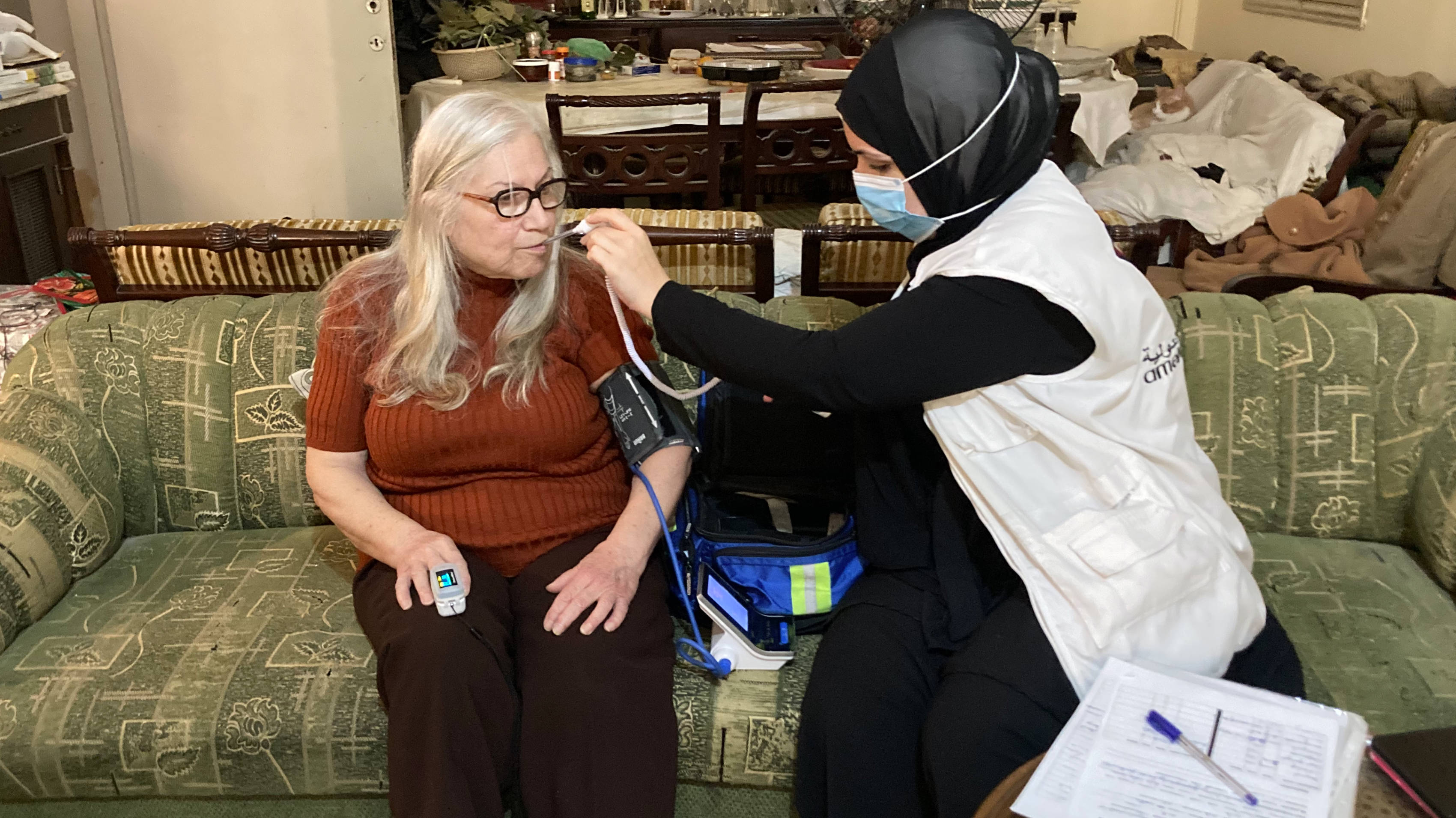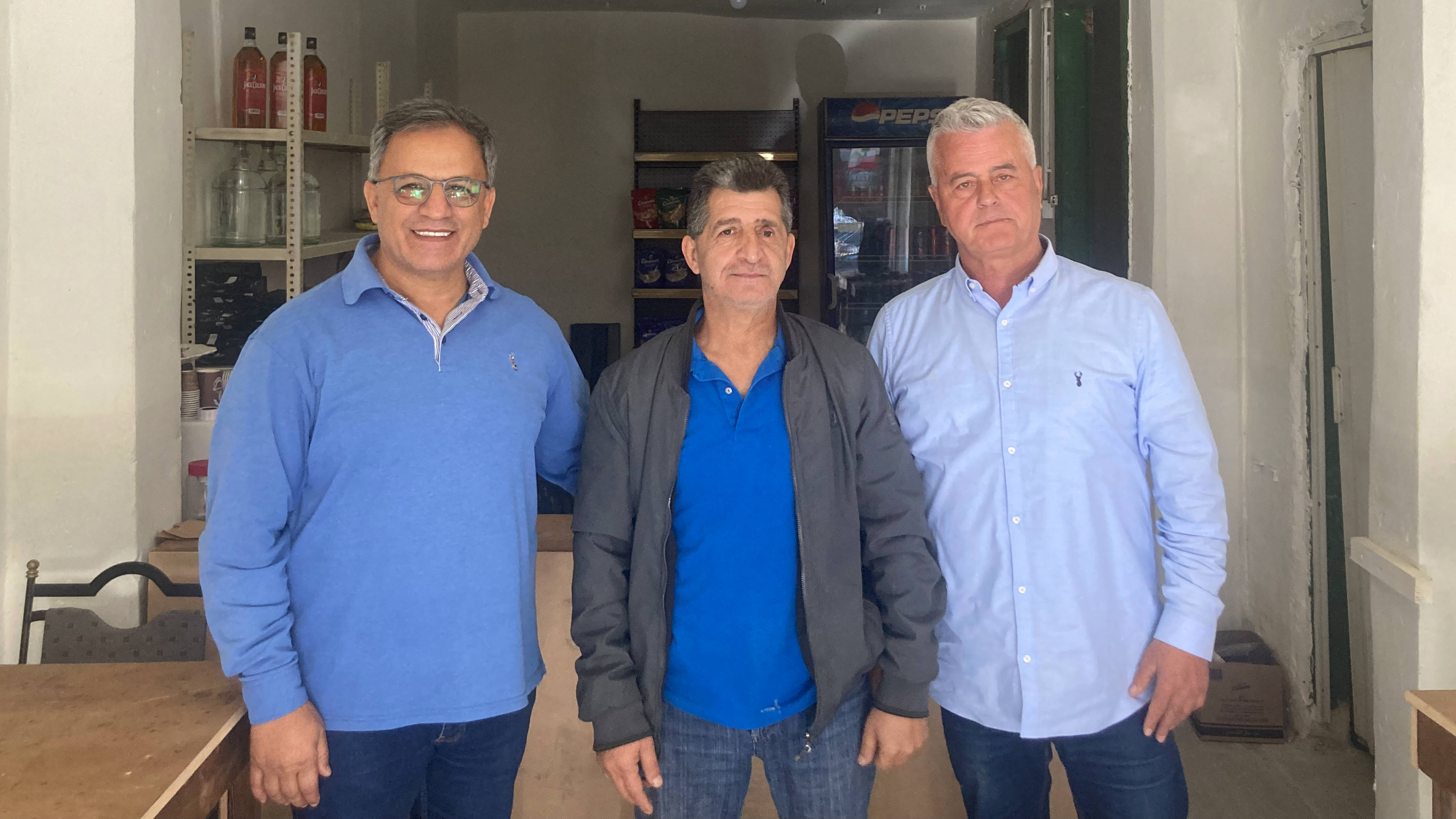'I feel abandoned': Lebanon's elderly have few options to survive

Hekmat Skaff sits all day behind the counter of his grocery store in Achrafieh, a central district of Beirut. He knows the prices of all items by heart and, as clients walk in and out, adds them up on a piece of paper.
At 80 years old, he simply cannot stop working.
"I tired myself at work for 60 years, and all my money disappeared... I had put a lot of money in the bank, and now it's all gone," he tells Middle East Eye.
Like the majority of Lebanese, Skaff does not have access to the national pension scheme, which only a few public-sector professions benefit from, and was depending on his life savings to see him through his later days.
His savings, however, have been stuck in the bank since the start of Lebanon's financial meltdown towards the end of 2019. Banks no longer had enough dollars to pay depositors and imposed informal capital controls that allowed customers to take out only limited amounts at a highly discounted exchange rate.
Stay informed with MEE's newsletters
Sign up to get the latest alerts, insights and analysis, starting with Turkey Unpacked
The currency has been in a downward spiral ever since, sliding from 1,500 to the dollar before the crisis to a street rate of about 94,000 in May 2023, after hitting more than 100,000 in March.
In late 2021, the United Nations estimated that nearly half of Lebanon's population have been pushed into poverty since 2019.
"My plan was to travel, go smell the air in different countries, visit relatives," Skaff says. Instead, he needs to keep earning his living for as long as he physically can.
Just like Skaff, tens of thousands of elderly Lebanese who had saved up their entire life, now find themselves resourceless.
Those who can't go back to work depend on the goodwill of others to survive. According to the United Nations, 80 percent of Lebanese aged 65 and above rely on NGOs or family support for their everyday needs, while some are forced to beg in the streets.
'God would be my doctor'
In the popular district of Ain el-Remmaneh, 64-year-old Colette Abou Mechreq sits at home all day. When she stopped working a few years ago following health issues, the former secretary was given a compensation package of 15 million Lebanese pounds. At the time, that was the equivalent of $10,000, but with the currency devaluation, it is now only worth $150.
"I never thought we could drop this low. I used to live well. I don’t understand what happened," she says.
Abou Mechreq never married and doesn't have children. To pay the bills, she relies on her brothers and sisters.
"They help me, but with the crisis it's also very difficult for them, they have their own families to take care of and they are also getting old... It is hard because I feel like a burden," she says.
'I am afraid the landlord will kick me out, and I would have to go live on the streets'
- Bernadette Waked
Family support is still not enough to cover all of Abou Mechreq's needs. Twice a day, a local NGO, Amel, brings her hot meals and schedules regular doctor visits to her home.
"If it wasn't for that NGO, I would never see a doctor. God would be my doctor," she says.
In the neighbourhood, many old people are in the same situation as Abou Mechreq. They have no medical insurance and can't afford to pay for healthcare.
The Amel's geriatrician, Roy Melhem, tries to check up on them as often as he can.
"Due to the crisis, a lot of young people move to work abroad and leave their parents alone. The money they send back only covers the bare minimum but not medical treatments," Melhem says.
"For medication and some hygiene products they rely on us. We see a growing number of old people suffering because they are isolated."
'Nobody cares for people like me'
A few blocks away, 78-year-old Bernadette Waked has been waiting for the doctor and his team since the morning. They take her blood pressure, deliver her medication and a hot meal.
Waked had fallen down the social ladder in just a few months.
As an assistant CEO for a local company, she had lived comfortably, making $4,000 a month. But her company closed down after the start of the financial crisis, leaving her without income or even compensation. Her bank, meanwhile, had swallowed all her savings.
Today, Waked cannot afford food, drinking water or rent, which she hasn't paid in three years.
"I am afraid the landlord will kick me out, and I would have to go live on the streets," she says.
"I went into severe depression that impacted my health. I developed blood pressure issues, chronic pain in several parts of my body, cholesterol... I cry every day, and I am all alone.
"I feel abandoned. Nobody cares for people like me apart from a few NGOs."
Also bearing the crushing weight of the crisis are public-sector employees who receive pensions that have lost up to 90 percent of their value.
Soldier's House
Tony Yamine, 58, was a soldier in the Lebanese army. During his service, he was severely wounded and lost the use of his legs. Relieved from active duty, he became dependent on his $1,000 pension, which, even before the crisis, was not enough for a good life. But as the currency crashed, the value of Yamine's pension dropped to $60.
The former soldier now works every day from 7am to 5pm at Sanita, a local manufacturer of household products.
"I want to live with dignity [but] I hate to wait by the door for some charity to give me a food box," he says.
With other army veterans and former civil servants, Yamine took to the streets in 2017 to ask for a better welfare system. He also joined the anti-government protest movement of October 2019, when hundreds of thousands of Lebanese rallied against the political leadership as the economy unravelled.
"We wanted to get rid of corrupt politicians and change things. It didn’t work, but I still have hope," he says.
To increase solidarity among army veterans, 64-year-old General Joseph el-Asmar and 66-year-old General Georges Nader are working to set up what they call "Soldier's House", a space that doubles as a small supermarket and a barbershop where retired soldiers can buy items or get haircuts at discounted prices.
"I own the shops, and we negotiated with suppliers to get special prices. It will also be a place to gather before any upcoming protests," says Asmar.
Even though Lebanon is currently without a president or a prime minister, Asmar, Nader and a group of retired public servants still gather in front of the Lebanese parliament and the government's headquarters every few weeks to protest against living conditions.
"I have served 35 years in the armed forces to protect the state. I come from a culture of hard work and discipline. Can you imagine how odd it is for me to take to the streets?" says Nader.
"Do you know many countries where former soldiers protest? But we have no choice."
This article is available in French on Middle East Eye French edition.
Middle East Eye delivers independent and unrivalled coverage and analysis of the Middle East, North Africa and beyond. To learn more about republishing this content and the associated fees, please fill out this form. More about MEE can be found here.






